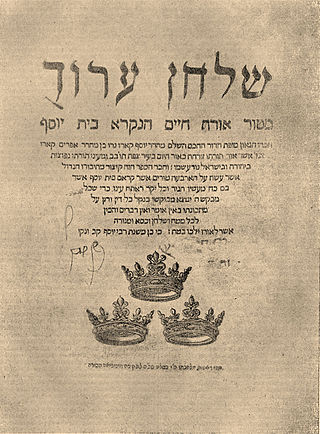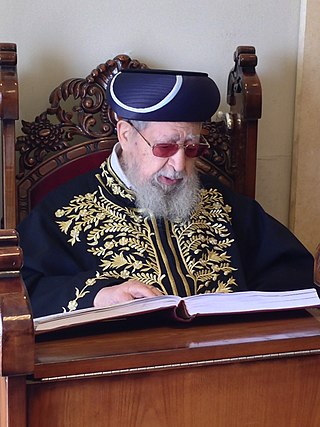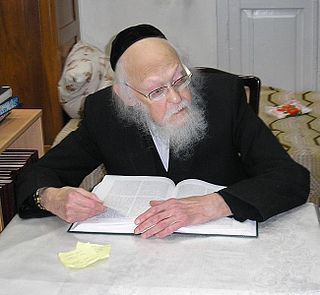
Hasidism or Hasidic Judaism is a religious movement within Judaism that arose in the 18th century as a spiritual revival movement in contemporary Western Ukraine before spreading rapidly throughout Eastern Europe. Today, most of those affiliated with the movement, known as hassidim, reside in Israel and in the United States.

Joseph ben Ephraim Karo, also spelled Yosef Caro, or Qaro, was a prominent Sephardic Jewish rabbi renowned as the author of the last great codification of Jewish law, the Beit Yosef, and its popular analogue, the Shulhan Arukh. Karo is regarded as the preeminent halakhic authority of his time, and is often referred to by the honorific titles HaMechaber and Maran.

The Shulchan Aruch, sometimes dubbed in English as the Code of Jewish Law, is the most widely consulted of the various legal codes in Judaism. It was authored in Safed, Ottoman Syria by Joseph Karo in 1563 and published in Venice two years later. Together with its commentaries, it is the most widely accepted compilation of halakha or Jewish law ever written.

A Rebbe or Admor is the spiritual leader in the Hasidic movement, and the personalities of its dynasties. The titles of Rebbe and Admor, which used to be a general honor title even before the beginning of the movement, became, over time, almost exclusively identified with its Tzadikim.

United Torah Judaism, often referred to by its electoral symbol Gimel, is a Haredi, religious conservative political alliance in Israel. The alliance, consisting of Agudat Yisrael and Degel HaTorah, was first formed in 1992, in order to maximize Ashkenazi Haredi representation in the Knesset. Despite the alliance splitting in 2004 over rabbinical differences, the parties reconciled in 2006, in order to prevent vote-wasting. In April 2019, the party achieved its highest number of seats ever, receiving eight seats.

Shas is a Haredi religious political party in Israel. Founded in 1984 under the leadership of Rabbi Ovadia Yosef, a former Israeli Sephardi chief rabbi, who remained its spiritual leader until his death in October 2013, it primarily represents the interests of Sephardic and Mizrahi Haredi Jews.

A kippah, yarmulke, yamaka, bullcap, or koppel is a brimless cap, usually made of cloth, traditionally worn by Jewish males to fulfill the customary requirement that the head be covered. It is the most common type of head-covering worn by men in Orthodox Jewish communities during prayers and by most Orthodox Jewish men at most other times. Among non-Orthodox Jewish individuals, some wear them at most times, while most wear them only during prayer, while attending a synagogue, or at other ceremonies, and others wear them rarely or never.

Ovadia Yosef was an Iraqi-born Talmudic scholar, a posek, the Sephardi Chief Rabbi of Israel from 1973 to 1983, and a founder and long-time spiritual leader of Israel's ultra-Orthodox Shas party. Yosef's responsa were highly regarded within Haredi circles, particularly among Mizrahi communities, among whom he was regarded as "the most important living halakhic authority".
In Jewish law and history, Acharonim are the leading rabbis and poskim living from roughly the 16th century to the present, and more specifically since the writing of the Shulchan Aruch in 1563 CE.
Jewish leadership has evolved over time. Since the destruction of the Second Temple in Jerusalem in 70 CE, there has been no single body that has a leadership position over the entire Jewish diaspora. Various branches of Judaism, as well as Jewish religious or secular communities and political movements around the world elect or appoint their governing bodies, often subdivided by country or region.

Yosef Shalom Elyashiv was a Haredi rabbi and posek who lived in Jerusalem. Until his death at the age of 102, Rav Elyashiv was the paramount leader of both Israel and the Diaspora Lithuanian-Haredi community, and many Ashkenazi Jews regarded him as the posek ha-dor, the contemporary leading authority on halakha, or Jewish law.
In the Hebrew Bible and Jewish religious law, a mamzer is a person who is born as the result of certain forbidden relationships or incest, or the descendant of such a person. Mamzer status is not synonymous with the traditional western definition of illegitimacy, since it does not include children born to unmarried mothers.
Minhag is an accepted tradition or group of traditions in Judaism. A related concept, Nusach (נוסח), refers to the traditional order and form of the prayers.

Elazar Menachem Man Shach was a Haredi rabbi who headed Lithuanian Orthodox Jews in Israel and around the world from the early 1970s until his death. He served as chair of the Council of Sages and one of three co-deans of the Ponevezh Yeshiva in Bnei Brak, along with Shmuel Rozovsky and Dovid Povarsky. Due to his differences with the Hasidic leadership of the Agudat Yisrael political party, he allied with Ovadia Yosef, with whom he founded the Shas party in 1984. Later, in 1988, Shach criticized Ovadia Yosef, saying that, "Sepharadim are not suitable for leadership positions" clearly viewing them as sub-Jewish, and subsequently founded the Degel HaTorah political party representing the Litvaks in the Israeli Knesset.
Mar, also Mor in Western Syriac, is an Aramaic word meaning "lord". The corresponding feminine forms in Syriac are Morth and Marth for "lady".
Rav is the Hebrew generic term for a person who teaches Torah or is a Jewish spiritual guide or a rabbi. For example, Pirkei Avot states (1:6) that:
(..) Joshua ben Perachiah says, "Set up a teacher [RaB] for yourself. And get yourself a friend [HaBeR]. And give everybody the benefit of the doubt."
Gadol or godol is used by religious Jews to refer to the most revered rabbis of the generation.
Gaon may have originated as a shortened version of "Rosh Yeshivat Ge'on Ya'akov", although there are alternative explanations. In Ancient Hebrew, it referred to arrogance and haughty pride and later became known as a general term for pride, both the positive and negative forms. Today, it may refer to:
There are a number of honorifics in Judaism that vary depending on the status of, and the relationship to, the person to whom one is referring.

Sifrei Kodesh, commonly referred to as sefarim, or in its singular form, sefer, are books of Jewish religious literature and are viewed by religious Jews as sacred. These are generally works of Torah literature, i.e. Tanakh and all works that expound on it, including the Mishnah, Midrash, Talmud, and all works of Musar, Hasidism, Kabbalah, or machshavah. Historically, sifrei kodesh were generally written in Hebrew with some in Judeo-Aramaic or Arabic, although in recent years, thousands of titles in other languages, most notably English, were published. An alternative spelling for 'sefarim' is seforim.










